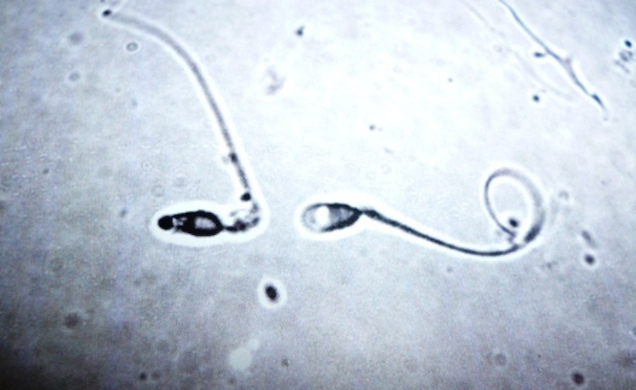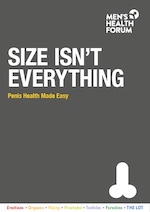Know Your Knob: all our penis health links
Sperm FAQs

I know the little wrigglers make babies but how?
Well, it's quite a feat - a 300,000,000 to 1 shot.
Sperm are tadpole-shaped and about 0.05mm long. From puberty onwards, at least 1,000 sperm a minute are manufactured in the testicles. They take about two and half months to mature and spend the last couple of weeks in the epididymis.
Sperm swim at six inches a second but at the point of ejaculation they are propelled a lot faster - about 28mph along with the rest of the seminal fluid. Two minutes after entering the female, they're at the cervix and five minutes later at the fallopian tubes. During the most fertile part of the female menstrual cycle (when the egg is released - usually between the 12th and 18th day), this journey is much easier because at this time there is plenty of fertile mucus around for the sperm to live off. They can survive like this for a week.
The average ejaculation contains 200-300 million sperm but it only takes one to fertilise the egg. (Just as well as only about 40 of them will get anywhere near the end of the race.)
As well as fertilising the egg, the sperm contains the chromosomes which will determine the baby's sex.
Is it true that sperm counts are falling?
It appears to be. Research suggest that in the last fifty years or so, the number of sperm in the average western male's semen has halved.
Today, about one in seven Britons will seek advice on pregnancy difficulties at some time in their lives. The male will be the cause of the problem in around half of these cases. (About 70% of male infertility problems are caused by a low sperm count.)
All the following can reduce sperm count:
- anabolic steroids (very severely)
- anti-arthritis drugs
- alcohol
- cocaine
- chemotherapy
- frequent marijuana use
- low levels of minerals such as zinc
- low levels of vitamins, particularly vitamin C
- smoking (reduces the sperm's life expectancy and sense of direction)
- some other prescription drugs (this includes, according to research from Queen's University, Belfast published in April 2004, so-called potency drugs like viagra which is a good argument against 'recreational' use of these drugs by men who might want to start families.)
- stress
- a vasectomy which may not be as reversible as is sometimes believed.
I don't want any more kids at my age. Is a vasectomy safe?
Most of the time, yes. We have a page that answers all your vasectomy related questions - The Snip FAQs
MAIN IMAGE: Sperm by Iqbal Osman licensed under CC BY 2.0
We don't currently post comments online but are always keen to hear your feedback.
Date published
02/04/14
Date of last review
02/04/14
Date of next review
02/04/17
References
|
The Men’s Health Forum need your support It’s tough for men to ask for help but if you don’t ask when you need it, things generally only get worse. So we’re asking. In the UK, one man in five dies before the age of 65. If we had health policies and services that better reflected the needs of the whole population, it might not be like that. But it is. Policies and services and indeed men have been like this for a long time and they don’t change overnight just because we want them to. It’s true that the UK’s men don’t have it bad compared to some other groups. We’re not asking you to ‘feel sorry’ for men or put them first. We’re talking here about something more complicated, something that falls outside the traditional charity fund-raising model of ‘doing something for those less fortunate than ourselves’. That model raises money but it seldom changes much. We’re talking about changing the way we look at the world. There is nothing inevitable about premature male death. Services accessible to all, a population better informed. These would benefit everyone - rich and poor, young and old, male and female - and that’s what we’re campaigning for. We’re not asking you to look at images of pity, we’re just asking you to look around at the society you live in, at the men you know and at the families with sons, fathers and grandads missing. Here’s our fund-raising page - please chip in if you can. |



